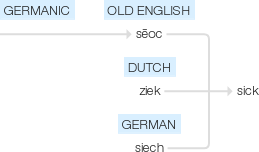Sick
Old English sēoc ‘affected by illness’, of Germanic origin; related to Dutch ziek and German siech .
wiktionary
From Middle English sik, sike, seek, seke, seok, from Old English sēoc(“sick, ill”), from Proto-West Germanic *seuk, from Proto-Germanic *seukaz (compare West Frisian siik, Dutch ziek, German siech, Norwegian Bokmål syk, Norwegian Nynorsk sjuk), Danish syg, from Proto-Indo-European *sewg-(“to be troubled or grieved”); compare Middle Irish socht(“silence, depression”), Old Armenian հիւծանիմ(hiwcanim, “I am weakening”).
Variant of sic, itself an alteration of seek.
etymonline
sick (v.)
"to chase, set upon" (as in command sick him!), 1845, dialectal variant of seek. Used as an imperative to incite a dog to attack a person or animal; hence "cause to pursue." Related: Sicked; sicking.
sick (adj.)
"unwell," Old English seoc "ill, diseased, feeble, weak; corrupt; sad, troubled, deeply affected," from Proto-Germanic *seuka-, which is of uncertain origin. It is the general Germanic word (compare Old Norse sjukr, Danish syg, Old Saxon siok, Old Frisian siak, Middle Dutch siec, Dutch ziek, Old High German sioh, Gothic siuks "sick, ill"), but in German and Dutch displaced by krank "weak, slim," probably originally with a sense of "twisted, bent" (see crank (n.)).
Restricted meaning "having an inclination to vomit, affected with nausea" is from 1610s; sense of "tired or weary (of something), disgusted from satiety" is from 1590s; phrase sick and tired of is attested from 1783. Meaning "mentally twisted" in modern colloquial use is from 1955, a revival of the word in this sense from 1550s (sense of "spiritually or morally corrupt" was in Old English, which also had seocmod "infirm of mind"); sick joke is from 1958.
sick (n.)
"those who are sick," Old English seoce, from sick (adj.).
